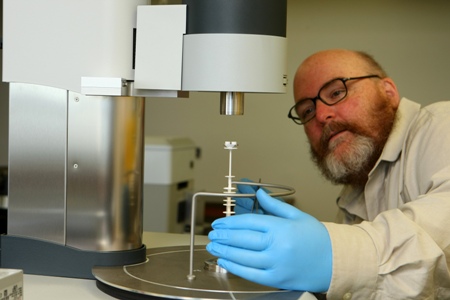Nov 26 2012
Today's conventional manufacturing processes for aircraft engine parts often start with large blocks of solid material, of which up to 90% may be cut away to produce the part. This is both costly and requires significant energy.
 Dr. Corbin working in his lab. (Nick Pearce, Dalhousie University.)
Dr. Corbin working in his lab. (Nick Pearce, Dalhousie University.)
"We want to develop new ways to make these superalloy engine parts at lower costs, through the use of less material and less energy and therefore making less of an environmental impact," says Dr. Stephen Corbin.
In partnership with Pratt & Whitney Canada, Dr. Corbin will investigate two metallurgical processes (i.e. brazing and sintering) capable of developing a net shape manufacturing method using less material. Advanced thermal analysis tools will be used to gain detailed insight into the brazing and sintering processes to optimize these methods.
This research into advanced materials processing will lead to better manufacturing methods that will revolutionize how aircraft engine parts are made while reducing both costs and the industry environmental footprint, and benefitting Canada's economy.
One goal of the Chair is to further develop highly qualified personnel, which is key to keeping the industry healthy in Canada. The Chair will provide graduate students with a unique opportunity to work closely with Pratt & Whitney Canada to better understand the relationship between basic science and application in an engineering manufacturing environment.
"A distinguished leader in his field with extensive experience working with industry, Dr. Corbin's challenging research program promises to bring significant advancements for the materials used by Canada's aerospace sector," says Suzanne Fortier, president of NSERC. "The state-of-the-art facilities accessible through this research program provide a unique training experience for Dr. Corbin's students, as they work to address challenges currently being faced by aerospace companies."
The NSERC-IRC is a five-year renewable program that promotes the advancement of emerging or established engineering research fields that benefit Canadian industry.